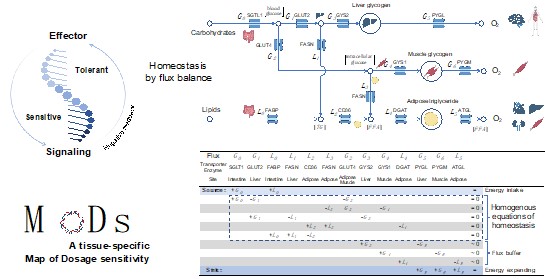RNA Derived Gene Dosage Constraint Map Reveals Homeostasis Code Behind Mendelian Diseases
Prof. LI Xin's group from the Shanghai Institute of Nutrition and Health of the Chinese Academy of Sciences, constructed a gene dosage constraint map from large human transcriptome biobanks. The dosage map uncovers a mechanistic link between Mendelian inheritance and homeostasis of biological systems.
Why Mendelian diseases have dominant vs. recessive modes is a long-standing question in genetics. A comprehensive understanding of gene dosage constraint is critical for answering this question. However previous knowledge of dosage constraint was mainly based on loss-of-function mutations or copy number variations in human populations, which is underpowered due to ultra-rareness of such mutations.
To overcome such challenges, LI Xin's group draw insights from wide-spread transcriptome (RNA) variation among human populations and utilize cis-regulatory variation (regulatory elements which instruct the transcription of DNA to RNA) to construct an RNA based gene dosage sensitivity map across human tissues. This new map more directly reflects dosage constraints of genes under physiological conditions.
Based on the new dosage map, the group further explored functional implications of dosage constraints and discovered that negative feedback for maintaining homeostasis is the major force shaping dosage sensitivity. Genes differ in their dosage sensitivity because of their different roles in negative feedback axes, where signaling genes (transcription factor, protein kinase, ion-channel and cellular machinery) are dosage sensitive, while effector genes (metabolic enzyme, transporter, cytokine and receptor) are dosage tolerant.
The tissue-specific map of gene dosage sensitivity (MoDs) can help better understand pathogenic modes of inheritance (dominance vs. recessiveness), and infer which tissues may be affected by a genetic mutation. By identifying effector vs. signaling components along negative feedback axes, MoDs can further inform underlying homeostasis mechanism of human diseases and guide the development of effective therapeutics.
The study, titled "An RNA informed dosage sensitivity map reflects intrinsic functional nature of genes", was published in American Journal of Human Genetics on August 23, 2023.
This work was funded by the National Natural Science Foundation of China and the Ministry of Science and Technology of China.

MoDs reveals the relationship between Mendelian inheritance and homeostasis of biological systems. (Image by Prof. LI’s group)
WANG Jin
Shanghai Institute of Nutrition and Health,
Chinese Academy of Sciences
Email: wangjin01@sinh.ac.cn
Web: http://english.sinh.cas.cn/
